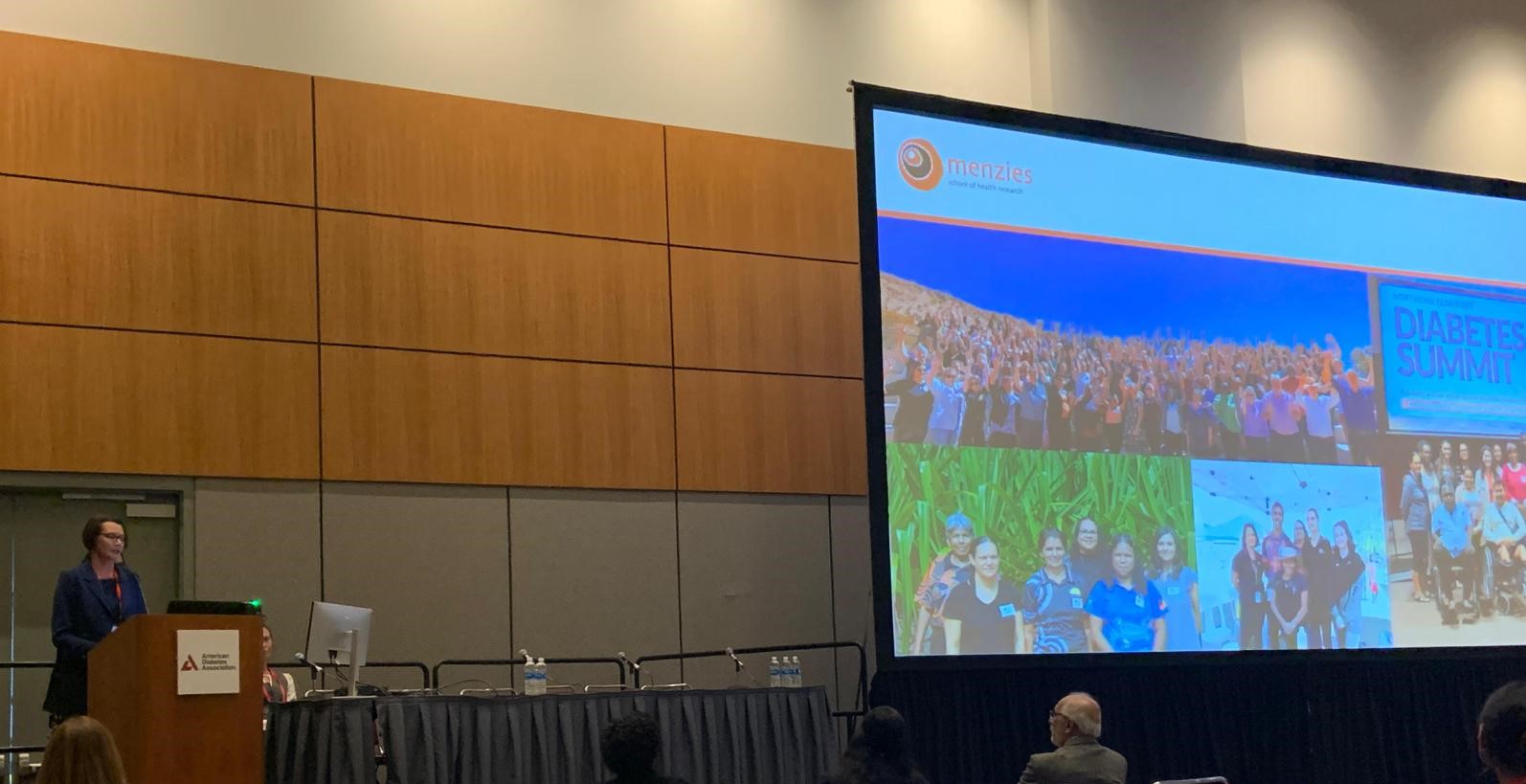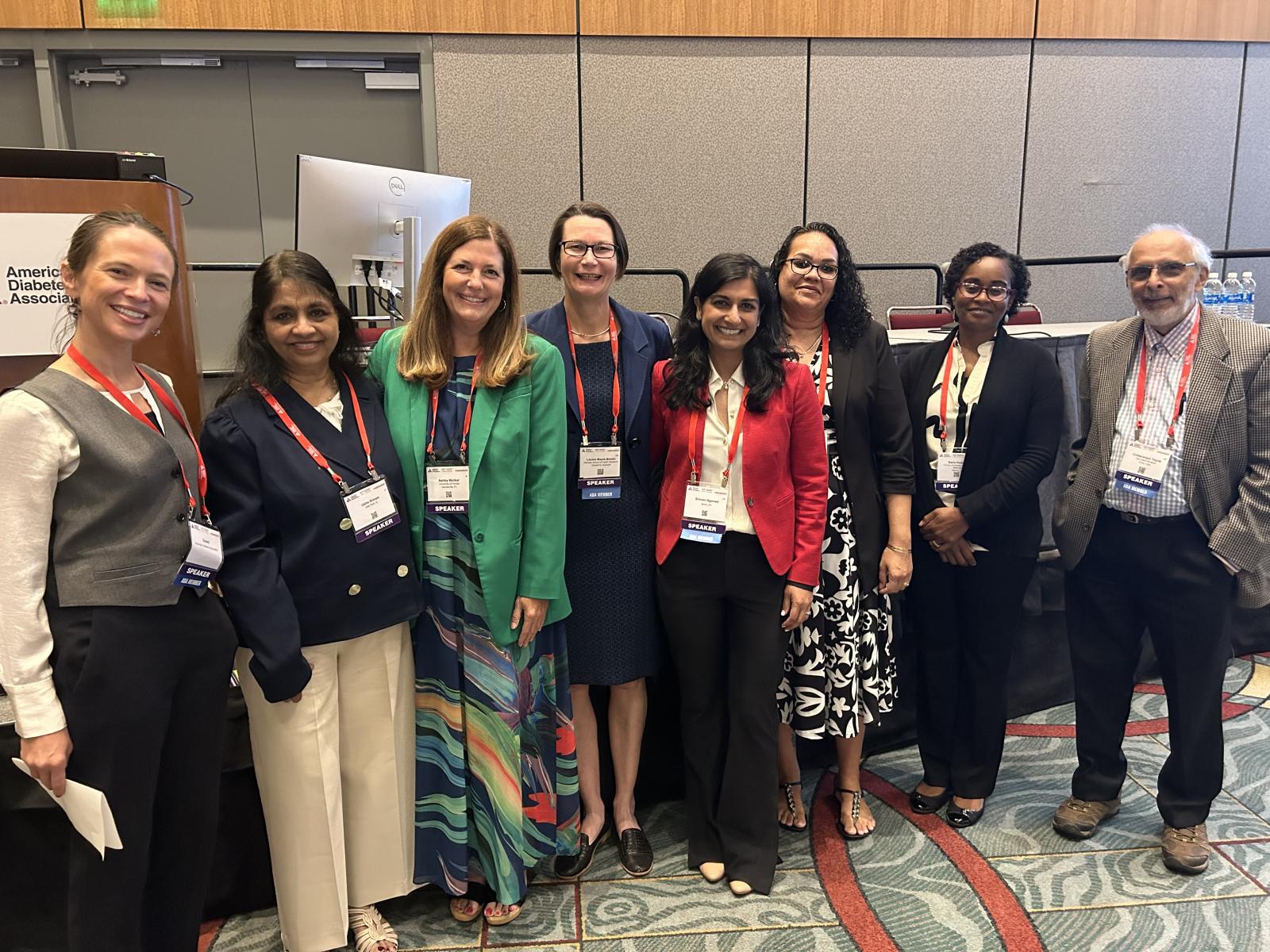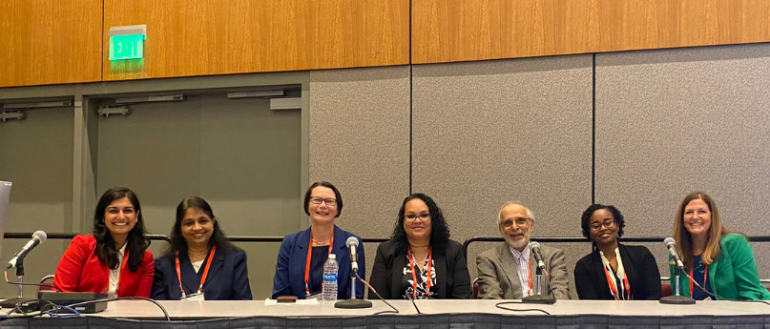Image 1: Menzies researchers, Professor Louise Maple-Brown and Sian Graham (centre) present as part of a panel of global diabetes experts.
A new series on diabetes research published in The Lancet and The Lancet Diabetes & Endocrinology journals has found diabetes is pervasive, growing in prevalence and outpacing most diseases globally, despite increased awareness and ongoing multinational efforts.
Menzies School of Health Research’s (Menzies’) work is part of a larger global study that reported on how longstanding structural racism and inequity is contributing to higher rates of diabetes and poorer health outcomes amongst marginalised populations around the world.
Co-author and Menzies’ Deputy Director Research, Professor Louise Maple-Brown, said diabetes remains the leading cause of death for Aboriginal and Torres Strait Islander females nationally and for all Aboriginal people in the Northern Territory.
Professor Maple-Brown said structural racism is contributing directly to poor health outcomes.
“A misalignment of health systems with sociocultural norms and health behaviours of communities is exacerbating this. Generational mistrust and trauma are also hampering the ability of patients to access and experience high-quality diabetes care,” she said.
“There are changes that can be made to improve health outcomes as Menzies’ long-running involvement in diabetes research has demonstrated.”
Senior Research Officer, Sian Graham, was also invited to be a co-author on the series with Menzies' contribution drawing on the long-running work of the Diabetes across the Lifecourse; Northern Australian Partnership (the Partnership). The Partnership led by Menzies originally began in the Northern Territory in 2011 with foundation partners Aboriginal Medical Services Alliance of the Northern Territory (AMSANT), Baker Heart and Diabetes Institute, Healthy Living NT and NT Health. It has since grown to include parts of Queensland and Western Australia in collaboration with the Apunipima Cape York Health Council, Central Australian Aboriginal Congress (CAAC), Diabetes Australia, Kimberley Aboriginal Medical Services (KAMS), Mater Research, Miwatj Health Aboriginal Corporation, Monash University, Northern Territory Primary Health Network (NT PHN), Telethon Kids Institute, the Queensland Government (Cairns and Hinterland Hospital and Health Service and Torres and Cape Hospital and Health Service) and Wuchopperen Health Service.
Central Australian Aboriginal Congress’ Chief Medical Officer Public Health, Dr John Boffa, said more needs to be done to address the social determinants of health.
“There has been significant health gain for Aboriginal people in Central Australia since 2001 primarily due to health system improvements and the gap is now closing but at the same time the social determinants of health beyond the health system have barely changed,” he said.
"Poverty and inequality have got worse in remote communities as has food security. Small gains in education attainment and overcrowding are not sufficient to make a difference. For a nation as wealthy as Australia the lack of progress is not acceptable and we will see the obesity and diabetes epidemic continue despite more effective treatments becoming available.”
Senior Research Officer, Sian Graham, said while the figures are grim, there are solutions that can help improve health outcomes.
“Structural changes to the health systems and new partnerships must be forged to re-engage and rebuild trust with Aboriginal and Torres Strait Islander communities,” she said.
"Aboriginal and Torres Strait Islander health workers, liaison officers, and interpreters must be included in health systems to advocate for communities, provide resources in local languages, and enable access to high-quality medical care for communities. In addition, access to healthy food in remote communities must be addressed. Integrating Aboriginal and Torres Strait Islander people into care will work to break this intergenerational cycle of diabetes.”
As part of the series, the Partnership being led by Menzies was as an example of best practice to address the impact of structural racism and global inequity on diabetes cases and care.
Also published in The Lancet, the paper, Interventions to address global inequity in diabetes: international progress, codifies and highlights best practice approaches to achieve equity in diabetes care and outcomes.
The Northern Territory’s Chief Health Officer, Adjunct Professor Christine Connors, said the Partnership has achieved rapid translation of research findings into policy and practice change.
“It has happened through strong relationships and true partnerships between researchers, primary health care, Aboriginal community-controlled health organisations and Aboriginal and Torres Strait Islander communities,” she said.
“This has facilitated improved health outcomes for people living with diabetes and related conditions. However, the health system cannot manage alone the significant increase in diabetes and all the associated complications without improvements in the underlying factors driving this epidemic including inter-generational poverty and food insecurity.”
Aboriginal Medical Services Alliance Northern Territory’s Acting CEO, Donna Ah Chee, agrees.
“To address one of the world’s highest rates of diabetes in Aboriginal people, entrenched poverty, food insecurity and structural racism must be comprehensively addressed,” she said.
"Community controlled organisations must be equal partners with government in order to turn around this crisis.”
Professor Louise Maple-Brown and Sian Graham recently visited the USA to present the findings at the joint American Diabetes Association / The Lancet symposium on Global Inequity in Diabetes - An International Perspective to discuss Structural Racism and Geographic Inequity in Diabetes.
To read more about the work by Menzies and the Partnership which been funded by the Australian Government’s Department of Health, Medical Research Future Fund and National Health and Medical Research Council head to the Partnership website.

Image 2: Menzies’ Deputy Director Research, Professor Louise Maple Brown, presents on the Diabetes Across the Lifecourse: The Northern Australian Partnership at the American Diabetes Association / The Lancet symposium on Global Inequity in Diabetes in San Diego, USA.

Image 3: Menzies researchers, Professor Louise Maple-Brown (fourth from left) and Sian Graham (third from right) with a range of global diabetes experts presenting at the joint American Diabetes Association / The Lancet symposium in June.

